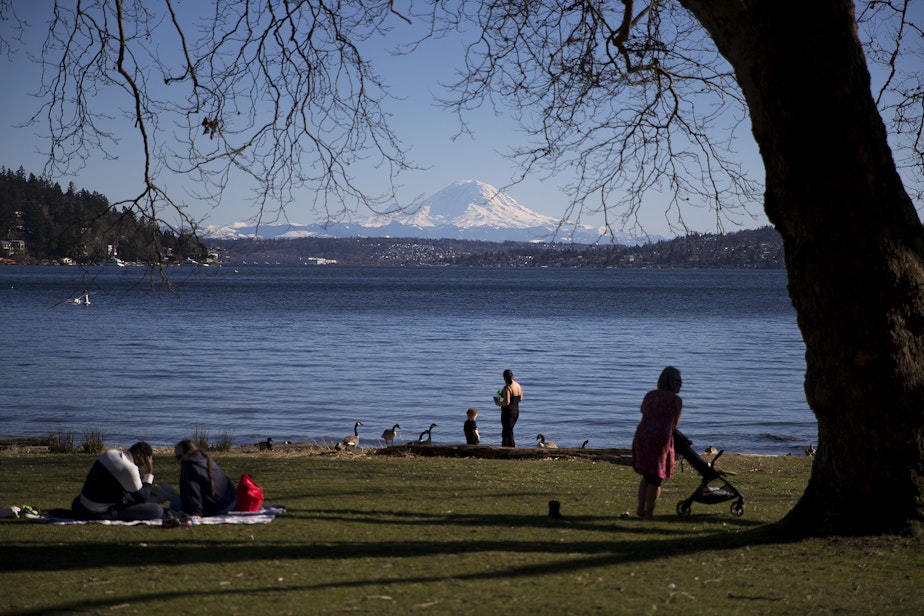Inslee unveils new plan to tackle climate change 'head on' in WA

Washington Gov. Jay Inslee says there’s no silver bullet for the climate, so he’s pushing a sweeping package of policies to lower the state’s carbon footprint, economy-wide.
“We need to move forward with these strong steps if we are going to meet our legislatively adopted requirements and our moral obligations to ourselves and our grandchildren,” Inslee said during a press conference on Tuesday.
His proposed legislation would cap carbon dioxide emissions from big polluters, make automobile fuels more climate-friendly, and phase out fossil fuel use in new buildings over the course of a decade.
It would also put “environmental justice” at the center of decision-making, by aiming to involve and benefit the communities most harmed by climate change and other forms of fossil fuel pollution.
Fees paid by big polluters would help low-income communities invest in clean energy and get green jobs.
“Environmental and racial justice is the way we achieve our climate goals and make them last,” said state Sen. Rebecca Saldaña, D-Seattle, at the press conference announcing Inslee’s proposals.
Sponsored
In a year defined by crisis, Inslee said one pandemic shouldn’t push another one off the public agenda.
“We have a long-term pandemic, if you will, of our state being on fire because of the pollution that causes climate change,” he said.
The Sierra Club praised Inslee’s “bold plan” to curb pollution from buildings, the state’s fastest-growing source of greenhouse gas emissions. The proposal would ban the use of gas in new construction by 2030 and phase it out of existing buildings by 2050.
But others say that plan is lacking in urgency.
“Why are we even thinking about building buildings with gas when we have the technologies to electrify them right now?” questioned Patrick Mazza, a climate activist with 350 Seattle. “Why wait 10 years?”
Sponsored
Earlier this month, San Jose, California, prohibited natural gas in new commercial and high-rise residential buildings starting in August 2021. Seattle Mayor Jenny Durkan proposed a similar ban two days later.
With buildings lasting half a century or more, Mazza said allowing new construction with gas was committing the state to a future of pollution.
“We’re told we need to be reducing our carbon pollution by 6 or 7% a year to have any chance of remaining within the 1.5 Celsius limit set by Paris [climate accords].” Mazza said. “This is a lack of ambition.”
Preliminary data from the Washington Department of Ecology shows statewide output of carbon dioxide and other greenhouse gases rising 1.4% in 2018.
Cleaner fuels
Sponsored
While buildings are the state’s fastest-growing pollution source, transportation continues to do the most overall damage to the climate, putting out 45% of the state’s carbon dioxide.
Inslee wants to require fuel suppliers to reduce carbon emissions from their fuels 10% by 2028 and 20% by 2035, by imposing what’s known as a low-carbon fuel standard. California, Oregon, and British Columbia all have similar policies.
Inslee said his proposal for low-carbon fuels would have a "negligible" impact on prices at the pump, and would benefit the health of low-income communities, which often have dirtier air than wealthier areas.
But a fight is brewing with the state’s oil refineries. Oil companies have defeated similar proposals in Olympia in the past, as Inslee acknowledged at his press conference.
“If we don’t break the industry’s control over policymaking, we’ll be left with a planet that cannot sustain most of humanity,” Inslee said.
Sponsored
“A Low Carbon Fuel Standard (LCFS) program is among the worst possible paths forward for climate policy,” said Catherine Reheis-Boyd, the president of Western States Petroleum Association, in an emailed statement. “As experience in other states has shown, an LCFS is the least effective and most costly approach to carbon policy.”
The Oregon Department of Environmental Quality reports that its low-carbon program cost less than 3 cents a gallon last year.
For his part, Inslee said his proposals would help, not hurt, the economy.
"This is going to generate a lot of work for a lot of people with hammers," he said.
The petroleum association’s members include Marathon, Shell, and Phillips 66, owners of oil refineries in Anacortes and at Cherry Point, north of Bellingham. The oil giant BP owns a second refinery at Cherry Point.
Sponsored
BP ended its membership in the Western States Petroleum Association and other industry groups in February over its conflicting positions on climate policies, such as carbon pricing. That includes the cap and trade system Inslee first proposed in 2014, which the oil industry has fought since.
BP announced in February its aim to become carbon-neutral by 2050 “or sooner” and to support policies to help the world do the same. The company plans to reduce its oil output 40% this decade and invest more in renewable energy.
A BP spokesperson could not be reached for comment by the time this story was originally published.




